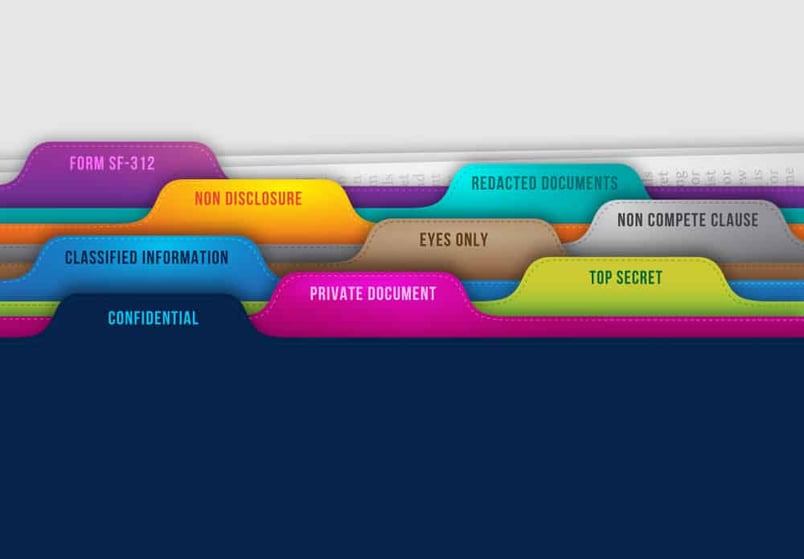The demand for non-disclosure agreements (NDAs) has more than doubled over the past two decades. Fifteen years ago, in-house counsel may have handled one or two specific NDAs, but the complexity of modern business demands that nearly every worker, client, or business partner sign on the dotted line before accessing proprietary information. Today, more than one-third of American workers are currently bound by NDAs.
Still scratching your head on what NDAs really are, why businesses need them, and what the potential ramifications may be? Then this guide is for you.

What is a Non-Disclosure Agreement in Simple Terms?
A non-disclosure agreement is a signed document that creates a confidential relationship between a person or business with sensitive information and another person or business receiving access to that information.
When a relationship is deemed “confidential,” the way certain information can be used or disclosed becomes legally protected.
These contracts may include one-way or two-way limitations, depending on the nature of the business arrangement and the parties involved.
What is the Purpose of a Non-Disclosure Agreement?
A non-disclosure agreement generally prevents confidential business information from falling into the hands of competitors or from being released to the public.
NDAs typically accomplish three main objectives:
- They identify protected information: By classifying information, parties understand appropriate boundaries for their work.
- They protect sensitive information: By protecting information, companies can remain profitable and competitive.
- They protect patent rights: By preventing premature public disclosure, inventors receive due credit for their ideas and intellectual property.
Who Needs a Non-Disclosure Agreement—and Why?
Common use cases and scenarios that require NDAs may include:
- New products: A company is planning to sell or license a new product, but does not wish to share its technical and financial data with others.
- New employees: To remain competitive, a business may intend to prevent its workers from stealing clients or taking sensitive, proprietary trade secrets to other companies.
- New partnerships: Information may need to be shared to help investors or prospective partners decide if they want to engage with the company.
- New clients: Onboarding new clients may mean sharing sensitive information about capabilities and resources.
- New mergers & acquisitions: When selling a business, financial and operations data will need to be temporarily shared with brokers and intermediaries.
A “trade secret” can be any information that provides economic advantage over a competitor. It may be a client roster, new market expansion plans, technical specs of a new product in development, proprietary research, or details about pending litigation.
Certain types of information—particularly those related to patient or consumer privacy—must be protected by law, otherwise businesses can be held liable for a breach. Therefore, it is up to every company to ensure that sensitive information is handled responsibly by all partners, employees, and vendors.
What are the Consequences of a Non-Disclosure Agreement?
It’s easy to see how NDAs benefit companies; keeping information private ensures that they remain profitable and competitive. These documents are relatively inexpensive to create as well—especially when compared to the cost of a lawsuit or lost business opportunities.
However, NDAs can create an atmosphere of mistrust with consumers, deter top talent from joining the payroll, or sour relationships with current employees.
As a legally binding document, breaking an NDA can trigger a number of consequence, such as:
- Lawsuits, potentially including criminal charges
- Monetary fines
- Employment termination
- Mandatory return of assets
Given these potential ramifications, one should only sign a non-disclosure after thoroughly reviewing the definitions, terms, and conditions.
What Should Every Non-Disclosure Agreement Contain?
NDAs may be presented as standalone documents or they may be part of an employment agreement or business contract. Every standard NDA includes the following:
- Identification of parties to the agreement
- A definition of what information is confidential
- A description of any information that is excluded from confidentiality
- Details about the receiving party’s contractual obligations
- The time period the NDA is enforceable
- Remedies for a breach of the NDA
What Parts of a Non-Disclosure Agreement are Optional?
Some—but not all—NDAs include:
- Non-compete clauses, which restrict future employment options such as leaving the company to immediately work for a direct competitor.
- Lawyer provision fees, which require the losing party in a breach lawsuit to pay all legal fees of the prevailing party.
Since the benefits of including these optional clauses are often seen as one-sided, you may consider striking them from your contract or negotiating their terms if you find them included in a contract you’re about to sign.
Negotiating NDAs Remains Crucial, and LexCheck Can Help
As you can see, negotiating the terms of an NDA is essential—no matter which side of the agreement you’re on. But the process of exercising appropriate due diligence can be extremely time consuming, and even expensive, if you need to have a lawyer combing through every clause across multiple agreements.
Increasingly, companies are leaning on automation and Artificial Intelligence (AI) technology to review contracts, call attention to potentially risky language, extract contextual information from past contracts, and suggest changes that are more in line with their preferred negotiating positions. And that’s exactly what you can do with LexCheck—the premier contract review and negotiation solution that’s revolutionizing how corporate legal departments approach the modern agreement.

